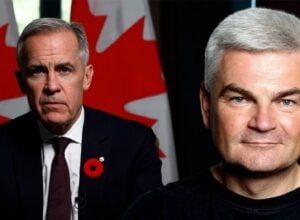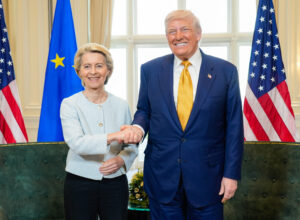Donald Trump nie zdążył jeszcze zameldować się oficjalnie w Białym Domu, a już złożył serię buńczucznych zapowiedzi. Przejmiemy Kanał Panamski! Kupimy Grenlandię! Zredukujemy Kanadę do roli 51. stanu USA! Do tego dochodzi zwyczajowa dla Trumpa obietnica: Stany Zjednoczone będą najwspanialsze i najpotężniejsze w historii!
Łatwo wyśmiać to wszystko jako typową megalomanię Trumpa – mistrza ściemy i autoreklamy, który zapewne nie spełni żadnej ze swoich bombastycznych obietnic. W poprzedniej kadencji jego największym osiągnięciem była obniżka podatków dla najbogatszych Amerykanów. Niewiele wyszło na przykład ze słynnej „budowy muru na granicy z Meksykiem, za którą zapłaci sam Meksyk”. To na poziomie faktów.
Na poziomie emocji kryje się tu jednak pułapka. Z jednej strony stoi on, człowiek z rozmachem i wyobraźnią mitomana, a z drugiej nudni technokraci tłumaczą punkt po punkcie, dlaczego to, to i jeszcze tamto jest niedorzeczne, niemożliwe, nie do pomyślenia. Czy w oczach swoich wielbicieli Trump może takie starcie przegrać?
Trump ustawia w ten sposób spór od wielu lat, a teraz ma po swojej stronie – przynajmniej chwilowo – Elona Muska, który dorównuje mu w konkurencji na obietnice z kosmosu. I choć Musk również ma kłopot z ich dotrzymywaniem, to i może się pochwalić kilkoma sukcesami. Tesla i SpaceX to nie są wydmuszki.
A jednak przeciwnicy Trumpa wciąż skwapliwie odgrywają swoją rolę nudnych technokratów. Szczególnie ci, którzy lubią opisywać samych siebie jako „liberałów”, „centrystów” czy „ludzi zdrowego rozsądku”.
Dlaczego?
Zaryzykuję tezę, że wcale nie z powodu zamiłowania do nudnych technokratycznych procedur. To trochę jak w końcowych scenach odcinków Scooby-Doo: ściągnij maskę centroliberała, a zobaczysz technokratę. Ale to tylko zmyłka przed głównym końcowym twistem. Ściągnij maskę technokraty, a zobaczysz… przerażoną twarz człowieka, który uwierzył Fukuyamie, że nadszedł „koniec historii”.
Wcisnąć pauzę, choćby na siłę
Kiedy słucham centroliberalnych diagnoz stanu globalnej polityki, przypomina mi się tekst socjologa Andrew Pickeringa na temat zmagań amerykańskiego rządu z rzeką Missisipi. Korpus Inżynieryjny Armii Stanów Zjednoczonych od lat próbuje tę rzekę kontrolować, między innymi za pomocą grobli. To frustrująca bitwa, bo rzeka raz po raz zachowuje się w sposób niezgodny z zamierzonym i wylewa się w niepożądanych miejscach.
Jak podsumowuje Pickering, całe to przedsięwzięcie to nic innego jak próba zatrzymania czasu – wstrzymania rzeki w granicach, które Korpus uznał za optymalne.
Centroliberałowie często zachowują się tak, jakby chcieli w podobny sposób wcisnąć „pauzę”. Najlepiej gdzieś na przełomie XX i XXI wieku. W „złotych czasach”, gdy wolnorynkowa globalizacja postępowała, Stany Zjednoczone były niepodzielnym hegemonem, a wokół panował rozciągający się od lewicy przez liberałów aż po prawicę konsensus, że nie ma co za bardzo grzebać w obecnym stanie rzeczy.
Dlatego liberalni centryści biją na alarm przerażeni wizją jakiejkolwiek zmiany. Podkreślam słowo „jakiejkolwiek”. Bo przeraża ich zmiana zarówno z prawa, jak i lewa.
Tak, będą ostrzegali przed oligarchicznym autorytaryzmem Trumpa i Muska, ale jednocześnie reagowali panicznie na każdy pomysł, aby poważnie podnieść podatki dla miliarderów, a tym samym choć trochę ograniczyć ich wpływy. Nie mówiąc już o – ich zdaniem całkowicie szalonym – pomyśle prawnego uniemożliwienia gromadzenia aż tak gigantycznych majątków.
Tak, są bardzo zaniepokojeni negacjonizmem klimatycznym Trumpa, ale nie mniej niepokoją ich lewicowe pomysły połączenia transformacji energetycznej z radykalną reformą polityki gospodarczej i niwelowaniem nierówności.
Tak, ostrzegają przed rasizmem Trumpa, ale natychmiast dodają, że humanitarne mrzonki lewicy o uniwersalnych prawach człowieka też są niebezpieczne.
Po tym najłatwiej poznać współczesnego liberała-centrystę: jest on w stanie nieustannego przerażenia myślą o tym, że cokolwiek na tym najlepszym ze światów miałoby się zmienić. A cała jego ambicja polityczna, cały plan i wielka wizja, sprowadzają się do tego, żeby tej zmianie zapobiec.
To nie przypadek, że po wygranej Trumpa w 2016 roku centroliberałowie zdefiniowali problem w kategoriach „populizmu”. Populizm to ludowe wzmożenie; takie wzmożenie to „fala”, a fale, jak wiemy, są groźne. Straszenie populizmem jest poręczne, bo pozwala swobodnie przeskakiwać między atakiem na „populistyczną prawicę” a atakiem na „populistyczną lewicę”. Kto nie wierzy, niech sobie poczyta, jak wiele mediów głównego nurtu w 2020 roku zestawiało ze sobą Sandersa i Trumpa, choć ich programy były diametralnie różne. A w Polsce niech zerknie na publicystykę Cezarego Michalskiego.
Fałszywa wizja historii
Centroliberałowie mają na ten zarzut gotową ripostę: to nie tak, że nie chcemy żadnej zmiany. Po prostu uważamy, że lewica chce ją robić za szybko, zbyt radykalnie, bez pomyślunku. Trzeba to robić powoli, stopniowo, z wyczuciem. Trzeba zapytać o zdanie ekonomistów. I episkopat.
Problem z tym argumentem polega na tym, że historia ostatnich stu lat kapitalizmu pokazuje, że zmiana społeczna rzadko zachodzi w tak żółwim tempie, jak chcieliby liberalni centryści. Najlepiej to widać, gdy prześledzi się dzieje jakiegoś konkretnego kraju.
Weźmy Francję. Gdybyście cofnęli się wehikułem czasu do 1934 roku, wylądowalibyście w kraju znacząco różnym od dzisiejszych standardów. Ludzie pracowali tam po 48 godzin tygodniowo – od poniedziałku do soboty. Płatne urlopy? Nie stosowano takich nowinek. Pracownicy nie mieli też zagwarantowanego prawa do strajku. Nie istniało wiele podstawowych usług publicznych, jak choćby powszechna opieka zdrowotna. Co więcej, kobiety nie miały prawa udziału w wyborach. Innymi słowy, był to kraj pełen nierówności.
Ale gdybyście wylądowali we Francji dekadę później – w roku 1945– zastalibyście zupełnie inną rzeczywistość. 40-godzinny tydzień pracy, publiczna ochrona zdrowia, płatne urlopy, prawo głosu dla kobiet, prawo strajku dla pracowników. Te wszystkie rewolucyjne zmiany dokonały się w ciągu dziesięciu lat!
Historia jest usłana podobnymi przypadkami nagłych zmian. Na przykład gwałtownymi skokami obciążeń podatkowych dla najbogatszych obywateli. Na początku XX wieku Stany Zjednoczone potrafiły w ciągu kilku lat zwiększyć stawkę z 7 do 77 proc.!
To zapomniana – albo: celowo wymazywana – część historii dwudziestowiecznych państw kapitalistycznych. Były to miejsca rewolucyjnych zmian przeprowadzanych nie tylko przez rządy lewicowe, ale czasem także prawicowe i liberalne.
Zgoda, często ta gwałtowna zmiana była wymuszana wyjątkowymi okolicznościami, takimi jak pierwsza i druga wojna światowa, a później lęk przed siłą polityczną Związku Radzieckiego. Ale my też chyba nie możemy narzekać na brak „wyjątkowych okoliczności”? Pogłębiający się kryzys klimatyczny (a szerzej: ekologiczny), wojny, postępująca oligarchizacja polityki, kolejne sukcesy skrajnej prawicy… aż po wojnę u bram Unii Europejskiej.
Tusk na ratunek?
Najgorzej, że zupełnie nie widać, by centroliberałowie wyciągnęli wnioski. Najbliżej właściwych wniosków był, paradoksalnie, staruszek Biden – przynajmniej w polityce wewnętrznej. Poobsadzał administrację różnymi progresywnymi osobami, które próbowały przepchnąć, co się dało. Ale nawet to spotkało się z grymaszeniem części polityków i mediów. Za bardzo się ten Biden słucha lewego skrzydła swojej partii! – grzmieli.
Znaczące były reakcje mediów na trudne negocjacje z Joe Manchinem w sprawie polityki klimatycznej. Biden miał naprawdę kompleksowy i rozbudowany plan inwestycji, uwzględniający także kwestie socjalne. Niemal cała partia była za. Blokował wszystko senator Manchin z Wirginii Zachodniej, którego głosu demokratom brakowało. Z mediów takich jak „New York Times” coraz częściej dochodziły głosy, że Biden za daleko zapędził się w lewicowej agendzie i powinien odpuścić. Ostatecznie udało się przeforsować znacznie mniej ambitną wersję początkowego planu.
Niemniej kolejni komentatorzy polityczni, coraz bardziej zdający sobie sprawę z impasu, w jakim znalazło się centrum, szukają pozytywnych przykładów. Ostatnio uczynił to politolog Iwan Krastew na łamach „The Atlantic”.
Zaczyna od słusznej diagnozy: liberalne centrum musi się pogodzić z tym, że coś się w świecie zmieniło: „Ludzie potrafią całkowicie zmienić swoje poglądy i tożsamość polityczną z dnia na dzień; to, co jeszcze wczoraj wydawało się nie do pomyślenia, dziś jawi się jako oczywiste. Zmiana jest tak głęboka, że ich własne niedawne przekonania i decyzje stają się dla ludzi niezrozumiałe”.
Potem przechodzi do pozytywnego przykładu polityka, który wyciąga z tego wnioski. Jest nim… Donald Tusk.
Pisze Krastew: „Partia Tuska przyjęła bardziej progresywne stanowisko w takich kontrowersyjnych kwestiach jak prawo do aborcji i ochrona praw pracowniczych, ale jednocześnie otoczyła się narodowymi symbolami i odwołała do patriotyzmu. Tusk zaproponował Polakom nową wielką narrację, a nie tylko inną strategię wyborczą”.
Dobrze by było! Tyle że my w Polsce dobrze wiemy, jak wygląda rzeczywistość. Gdy przyszło co do czego, nie nastąpił żaden postęp w kwestii praw kobiet, mniejszości czy pracowników. Trudno też zgadnąć, gdzie Krastew wyczytał tę „wielką narrację” Tuska, bo jej brak u premiera jest, jak wiadomo, programowy. Nie oszukujmy się, jedyna narracja brzmiała po prostu „pokonać PiS”.
Krastew dał się chyba ponieść entuzjazmowi po zwycięstwie antypisowskiej koalicji w wyborach parlamentarnych, choć cytowany tekst ukazał się w „Atlanticu” nie rok temu, a w ubiegłym tygodniu. Do myślenia powinien mu jednak dać przykład amerykański: można wygrać pojedyncze wybory, ale to jeszcze nie znaczy, że „populistyczna prawica” nie dopnie swego w kolejnym cyklu wyborczym.
Dzień świstaka
Centroliberalnym krytykom Trumpa i trumpizmu nie udało się zatrzymać historii. Z powodzeniem doprowadzili za to do sytuacji, w której każda próba odpowiedzi na „zmianę à la Trump” jakąś wersją „zmiany progresywnej” jest natychmiast demonizowana. Ich zdaniem jedyna odpowiedzialna lewica to taka, która dołącza do obozu centrystów w celu obrony lub przywrócenia status quo sprzed sukcesów Trumpa w Stanach, a PiS-u w Polsce. Sprzed brytyjskiego referendum z 2016 roku, które zakończyło się brexitem, i sprzed niecałego tygodnia, kiedy stery rządów w Austrii przejął skrajny prawicowiec Herbert Kickl. Widzicie prawidłowość?
Historia ruszyła do przodu i nie ogląda się na krytyków Trumpa, a oni utkwili na dobre w politycznej wersji Dnia świstaka.
Wygląda to mniej więcej tak: notowania Trumpa, Kaczyńskiego, AfD i Le Pen idą w górę, pojawia się panika, że demokracja upada, liberalizm odchodzi do lamusa, nastały ciemne wieki autorytaryzmu.
Potem sklecona naprędce szeroka koalicja centrowo-liberalno-lewicowa kontratakuje – Biden, Macron, Tusk wygrywają wybory. Hurra! Jesteśmy uratowani! Widzicie? Rozsądek, centryzm, umiarkowanie zwyciężają, a uleganie lewicowym fantazmatom grozi tylko destabilizacją.
Potem jednak znowu notowania Trumpa, Kaczyńskiego, AfD i Le Pen znów idą w górę i cała zabawa zaczyna się od nowa, a polityczna przestrzeń centrystów nieubłaganie się kurczy.
Nawet diagnoza, którą właśnie czytacie, jest elementem tego powtarzalnego schematu. Centroliberałowie robią w kółko to samo, co ktoś im wytyka, po czym oni dalej to robią, więc ktoś dalej im to wytyka…
Ta huśtawka nastrojów i powtarzalność sporów jest coraz bardziej męcząca, ale to mniejszy problem. Większym jest to, że taka taktyka ewidentnie nie działa na dłuższą metę. Wielkie koalicje liberalno-centrowo-lewicowe wygrywają pojedyncze wybory, ale problem natychmiast wraca. Skrajna prawica nie słabnie, tylko rośnie w siłę.
To jak ze stawianiem grobli na rzece Missisipi. Prędzej czy później rzeka wylewa. W końcu może zalać nas wszystkich.

 Wspieraj
Wspieraj 

 Wspieraj
Wspieraj  Wydawnictwo
Wydawnictwo 
 Zaloguj się
Zaloguj się 















